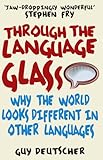Found in 2 comments on Hacker News
waterlion · 2013-12-12
· Original
thread
> Sapri-Whorf Hypothesis [sic] ... if the hypothesis stands
I don't think it does still stand, does it?
For an interesting, not-overly-academic look at Sapir-Whorf, I recommend http://www.amazon.co.uk/Through-Language-Glass-Different-Lan...


Yes. I've read a entertaining book on the subject ( http://www.amazon.com/Through-Language-Glass-Different-Langu... ). Especially fascinating was the Guugu Yimithirr language, which has no words for relative directions, no "left" or "right". Speakers of this language gained an amazing ability to know compass directions. If you lead them through a winding museum and then ask them to describe the Mona Lisa they would: "It's a lady, facing east." The Guugu Yimithirr forces everyone to be aware of compass directions at all times, and they get good at it.
The book draws the same conclusion: language forces us to learn, and reveal in conversation, certain concepts; but it does not limit our ability to understand foreign concepts.
The fun question then: what concepts does English force us to be aware of?